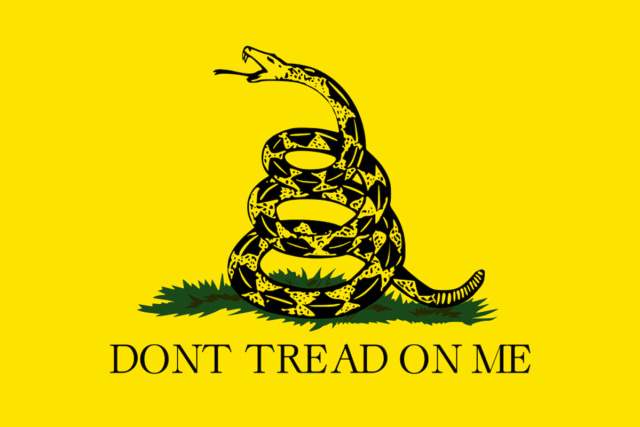
Don’t tread on me.
It looks fun on a flag and sort of has a nice ring to it, especially when taking into account the historical context of what it originally referenced: taxation, or at least taxation without representation by England against its citizens in what is now known as the U.S.A. Many have interpreted it nowadays to refer to a general overreach of the U.S. government into citizens’ “rights.”
For whatever the phrase means to you or me, it is mostly irrelevant since it is simply just a phrase. What resonates with me, however, is the mindset frequently attached: 1) that we are overtaxed, and 2) that our taxes are better off left in the pockets of those who are forced to pay them. And trust me, as a lifelong resident of Oklahoma, I have heard more than my fair share of boisterous complaints from “revenue experts” on the topic of tax dollars.
Taxes are important, and I challenge anyone to show evidence they aren’t. Whether we’re talking about the money spent on education or prisons or infrastructure or the military, society benefits from those tax dollars. You don’t believe you should have to pay for education because you don’t have kids? Ever wonder what the world around you would look like if uneducated people were making all the decisions? I personally don’t want to risk ever experiencing the answer to that question.
Yes, I get it that not all our tax dollars are spent in a way that some or even most of us would agree with. Everyone wants to complain until they are blue in the face (or red in the face, depending on which political party they represent) about having to pay taxes for things they don’t get to have full control over, but nobody seems to talk about the opposite side of the coin.
We go to the store and complain about the pennies we spend on each dollar that we hand over as part of our forced taxation, but nobody seems to want to sound the alarm on the nickels, dimes and quarters we are more than willing to hand over to the private businesses out there who make those products, provide those services or misspend through investments.
Free enterprise gets a free pass
It’s a shame, really, because it seems to be a reflection of our nationwide acceptance of the free-enterprise system of business that allows top-level executives to make ungodly amounts of money with little to no explanation as to why they need tens of billions of dollars to hold a fancy title while millions of underpaid workers get no credit for actually keeping the company afloat.
It should be noted that not all chief executives are overpaid or are incompetent, and many work extremely hard to earn a wage. But when CEO salaries and benefits are increasing at a ridiculously higher rate than the wages for those who are doing the actual work, it makes one wonder what actually drives up the cost of living for the consumers. And for every proponent of trickle-down economics, I can show you millions of workers who feel as if they are just being urinated on. For those businesses turning a profit, those revenues tend to stay at or near the top.
Secretive world of private business
So, sure, we may not like how our tax dollars are spent, and we may dislike government corruption even more. For those who complain about taxes, however, I offer up the equally corrupt and even more secretive world of private business.
The thing I’ve found about government corruption and secrecy is that it typically gets exposed eventually. Whether people believe it or even care about it usually depends on whether it is a Democrat or Republican who gets linked to said corruption, but there are tons of safeguards and oversight systems in place to keep a watchful eye on government. The media, congressional committees, watchdog organizations and the Government Accountability Office are all tasked with the job of keeping government officials honest and within the rules.
Corporations, on the other hand, are only regulated as much as is deemed necessary after a scandal. Don’t believe me? Just exactly how much are financial institutions being regulated since the 2008 real estate market bust that led to the millions of dollars in taxpayer-funded bailouts? As a reporter, try requesting financial information from a public entity and then from a private entity. The difference being: At some point, you will actually get your hands on the government information.
Corporate waste dwarfs government ineptitude
Taking a look at the times corporate leaders have been caught with their hands in the proverbial cookie jar shows us a significant number of people who are more than willing to take risks not only with their business decisions but also with the finances of the consumers who keep their companies profitable.
Whether it is the lavish expenditures of Yahoo CEO Marissa Mayer, the embarrassingly callous greed at Enron, the heartless cover-up at Volkswagen or the devastating Ponzi scheme embraced by our favorite corporate criminal, Bernie Madoff, our consumer expenditures on services, products and investments have been foolishly spent on a variety of criminal or otherwise questionable ways.
Any excessive waste of expenditures is just that, regardless of whether it is public or private money. It comes down to being money we spent with the belief that it would be used for something positive. We expect our tax dollars to be used for positive reinvestment in our nation. We also expect our consumer dollars to be used to reinvest in a company’s employees or to at least grow the business — not for them to pay for luxurious private flights or gold-plated toilets for people who spend more time at the country club than in the boardroom.
You remain free to complain
Want to complain about paying too much in taxes? You have that right, and, sometimes, you might be correct. But if you are going to let private corporations off the hook as you pay hundreds for a phone bill so they can sponsor every sporting event that will take their money (which is actually your money being “reinvested”), then you are just contributing to the problem.
Your money is being spent for someone else’s pleasure, but at least our taxes come back to us in the form of something — whether you support it or not.





















